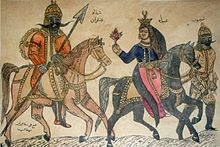Arabic Literature
Arabic literature emerged in the 5th century with only fragments of the written language appearing before then. The Qur'an, widely regarded as the finest piece of literature work in the Arabic language, would have the greatest lasting effect on Arabic culture and its literature. Arabic literature flourished during the Islamic Golden Age, but has remained vibrant to the present day, with poets and prose-writers across the Arab world achieving increasing success.
Pre-Islamic literature
Further information: Pre-Islamic poetry
The period before the writing of the Qur'an and the rise of Islam is known to Muslims as Jahiliyyah
or period of ignorance. Whilst this ignorance refers mainly to
religious ignorance, there is little literature before this time,
although significant oral tradition is postulated. Tales like those about Sinbad and Antar bin Shaddad
were probably current, but were recorded later. The final decades of
the 6th century, however, begin to show the flowering of a lively
written tradition. This tradition was captured over two centuries later
with two important compilations of the Mu'allaqat and the Mufaddaliyat.The Qur'an and Islam
Although it contains elements of both prose and poetry, and therefore is closest to Saj or rhymed prose, the Qur'an is regarded as entirely apart from these classifications. The text is believed to be divine revelation and is seen by Muslims as being eternal or 'uncreated'. This leads to the doctrine of i'jaz or inimitability of the Qur'an which implies that nobody can copy the work's style.
This doctrine of i'jaz possibly had a slight limiting effect on Arabic literature; proscribing exactly what could be written. The Qur'an itself criticises poets in the 26th sura, actually called Ash-Shu'ara or The Poets:
Aside from the Qur'an the hadith or tradition of what Muhammed is supposed to have said and done are important literature. The entire body of these acts and words are called sunnah or way and the ones regarded as sahih or genuine of them are collected into hadith. Some of the most significant collections of hadith include those by Muslim ibn al-Hajjaj and Muhammad ibn Isma'il al-Bukhari.
The other important genre of work in Qur'anic study is the tafsir or commentaries Arab writings relating to religion also includes many sermons and devotional pieces as well as the sayings of Ali which were collected in the 10th century as Nahj al-Balaghah or The Peak of Eloquence.


Walang komento:
Mag-post ng isang Komento